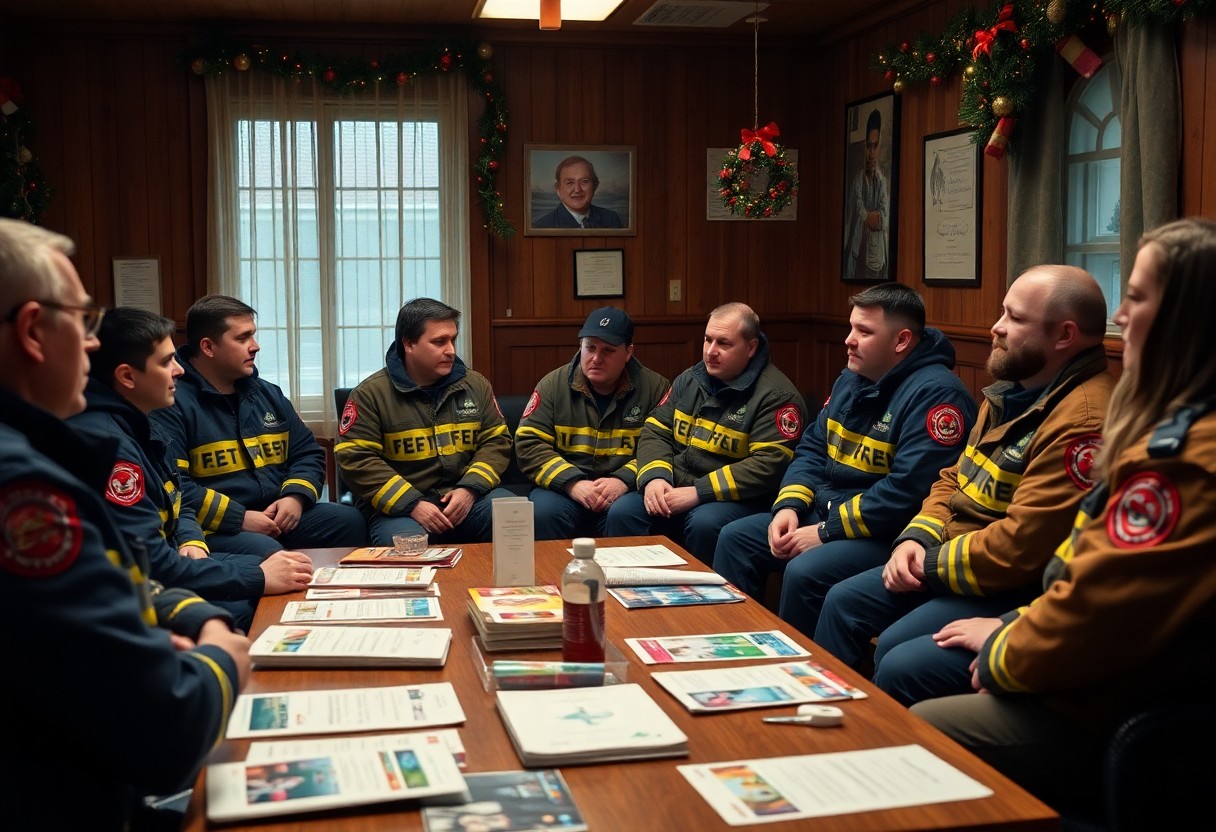Just as the festive season approaches, you may encounter unique challenges that can impact your mental health and that of the dedicated members in your volunteer fire department. The holidays can amplify stress, and it’s vital to recognize the signs of struggle while fostering a supportive environment. In this guide, you will explore imperative strategies and techniques to promote emotional well-being, enhance team cohesion, and encourage open communication among your responders, ensuring everyone feels valued and supported during this demanding time of year.
Understanding Mental Health in First Responders
To effectively support your team during the holidays, you must first grasp the unique mental health challenges faced by first responders. The nature of your work often exposes you to traumatic situations, which can lead to heightened stress levels and emotional strain. Understanding these factors is necessary for fostering a supportive environment within your volunteer fire department.
Signs of Stress and Burnout
Clearly, recognizing the signs of stress and burnout is vital in maintaining your team’s overall mental health. Symptoms may include irritability, fatigue, changes in sleep patterns, and withdrawal from social activities. By staying vigilant and supportive, you can help identify these signs early on and provide necessary interventions.
Importance of Mental Well-Being
First, prioritizing mental well-being is key to ensuring your team operates at its best. Consistent stress can lead to mental health issues such as anxiety and depression, ultimately affecting performance and decision-making. Promoting mental wellness initiatives allows you to advocate for a culture that values psychological resilience, leading to a more effective and cohesive team.
Health and safety in your role as a volunteer firefighter are directly linked to your mental well-being. A focus on emotional health not only strengthens your ability to handle emergencies but also enhances team dynamics and community trust. By actively addressing mental health, you contribute to a supportive atmosphere, where your team feels empowered to share their challenges and seek help when needed. This proactive approach benefits everyone, fostering a unified and resilient team ready to face any situation.
How-to Recognize the Unique Holiday Stressors
One of the most important steps in supporting your volunteer fire department’s mental health during the holidays is to recognize the unique stressors that come with this season. The combination of personal expectations and operational demands can create a perfect storm for mental health challenges. Awareness of these stressors allows you to foster an environment of support and resilience within your team.
Factors Affecting Mental Health During Holidays
Affecting mental health during the holiday season are various factors that can uniquely challenge first responders. Consider the following elements:
- Increased workloads
- Emotional strain
- Financial pressures
- Isolation from family
- Past traumatic experiences
Assume that these factors can pile up and contribute to increased stress and anxiety.
Identifying Personal and Team Stressors
Some of the most significant challenges can arise from personal and team dynamics that emerge during the holidays. It is vital to engage in open conversations about how the holiday season impacts individual team members, as well as the group as a whole.
With effective communication, you can pinpoint specific stressors that each member faces, such as holiday-related grief or team performance pressure. Understanding both personal and collective challenges enables you to tailor support initiatives, offering resources, coping strategies, and peer support mechanisms. This attentive approach fosters a stronger bond among team members while proactively addressing the mental health risks that arise during this time.
Tips for Supporting Volunteer Firefighters
It’s vital to provide ongoing support for your volunteer firefighters during the holidays. Consider implementing the following strategies:
- Encourage mental health check-ins
- Organize team-building activities
- Provide resources for counseling and therapy
- Recognize individual and team accomplishments
Fostering a culture that prioritizes mental health can enhance morale and help firefighters cope with seasonal stressors. Perceiving stressors as opportunities for growth can create lasting positive changes.
Creating a Supportive Environment
Volunteer fire departments should actively create a supportive environment that prioritizes your firefighters’ well-being. This can involve cultivating friendships, promoting teamwork, and establishing safe spaces for open dialogue. Ensure that each member understands the importance of mental health as part of their overall mission to serve the community.
Encouraging Open Communication
Even with a busy holiday schedule, it’s important to encourage open communication within your team. When firefighters feel their voices are heard, they can express their concerns and seek support without fear of judgment. This creates a sense of belonging that can help combat feelings of isolation during the festive season.
Supporting open communication helps build trust and fosters an atmosphere where your firefighters can discuss their feelings freely. You may want to initiate regular check-ins and informal gatherings where individuals can share their experiences. Emphasizing mutual support, and providing safe spaces for discussions can significantly decrease mental health risks during holidays. Through consistent efforts to prioritize communication, you create a stronger, more united team capable of facing challenges together.
How-to Implement Coping Strategies
Keep in mind that implementing coping strategies is crucial for maintaining mental health during the holiday season. Encourage your volunteer firefighters to engage in activities that promote connection, like group discussions or informal gatherings. Help them identify individual strengths to utilize their talents and create a sense of purpose, ultimately fostering resilience within your team.
Mindfulness and Relaxation Techniques
Little changes in your routine can lead to significant improvements in mental health. Introduce simple mindfulness practices such as breathing exercises or guided meditations, which can be done during downtime or scheduled breaks. Encourage firefighters to focus on the present moment, allowing them to reduce stress and cultivate a more positive mindset.
Time Management and Prioritization
For effective coping during stressful periods, it’s important to implement time management and prioritization techniques. Establish a clear schedule that balances emergency readiness with personal time, ensuring your team can recharge. Regularly assess workloads, and adjust responsibilities as necessary to avoid overwhelming any individual.
Techniques such as setting realistic goals and breaking tasks into manageable steps can significantly enhance your team’s efficiency. Using prioritization tools, like creating a matrix of urgency, helps to determine what tasks require immediate attention and which can wait. Encourage your fellow responders to acknowledge their limits and communicate openly about their workloads. This approach not only boosts morale but also ensures the safety and well-being of your entire team, making everyone more effective during critical times.
Tips for Leadership during Holidays
All leaders should actively engage in supporting your team’s mental health during the holiday season. Implementing effective strategies can make a significant difference. Consider these practical tips:
- Prioritize open communication about mental health challenges.
- Encourage team bonding activities to foster connection.
- Recognize and celebrate accomplishments to boost morale.
- Support work-life balance during busy holiday periods.
The well-being of first responders should be a top priority.
Leading by Example
One effective way to promote a healthy environment is by demonstrating your own mental wellness practices. Share your personal experiences and coping strategies with the team. When you openly discuss vulnerabilities and prioritize self-care, you create a culture where your members feel safe doing the same. This transparency can significantly strengthen team dynamics during challenging times.
Providing Resources and Training
An important aspect of leadership is ensuring your team has access to valuable resources. Offering training on mental health awareness can empower your volunteers to recognize and address challenges effectively.
Plus, providing resources like access to counseling services and mental health workshops helps equip your team with tools to navigate tough times. These initiatives can lead to a more resilient team capable of coping with stressors associated with the holidays. Making sure that your members feel supported and equipped with information can prevent the development of more serious mental health issues. Focus on fostering an environment where seeking help is normal and acceptable.
How-to Foster Team Bonding and Resilience
After experiencing the demands of emergency response, it’s important to cultivate an environment where your team feels connected and resilient. Building strong relationships among team members can significantly improve morale and mental health, particularly during the holiday season when stress can heighten. Fostering this bond not only enhances team performance but also creates a safety net for individuals facing emotional challenges.
Organizing Group Activities
Team bonding can be greatly enhanced through organized group activities. Hosting fun events, such as holiday parties, volunteer days, or outdoor adventures, allows your personnel to connect on a personal level, strengthening relationships beyond the fire station. These gatherings can serve as an important reminder of the shared purpose and camaraderie that fuels your team, especially during high-stress periods.
Building a Culture of Support
If you prioritize open communication and encourage team members to share their feelings, you can foster a strong support system within your department. It’s important to create an environment where everyone feels valued and understood, especially during challenging times.
Support from peers plays a significant role in nurturing mental health among team members. By promoting an atmosphere where honesty and vulnerability are valued, you can create a safe space for individuals to express their struggles. This fosters deep connections and enhances resilience, as members feel more comfortable reaching out when in need. Encouraging open dialogues around mental health, providing training on stress management, and normalizing discussions around feelings can ultimately lead to a healthier and more cohesive team dynamic during the holidays and beyond.
Final Words
From above, you have gained necessary strategies to support your mental health throughout the holiday season as a volunteer fire department leader. By prioritizing open communication, fostering a supportive environment, and encouraging self-care practices, you can enhance resilience among your team and ensure their well-being. Your proactive approach will not only benefit you but also create a positive atmosphere that supports all first responders. Embrace these practices to navigate the holidays with a mindset geared towards health and teamwork.
Q: How can volunteer fire department leadership support their team’s mental health during the holiday season?
A: Volunteer fire department leadership can support their team’s mental health during the holidays by promoting open communication and understanding about the stresses that can arise during this time. Organizing mental health workshops or informal gatherings can provide a safe space for team members to share their feelings. Additionally, leaders should encourage their volunteers to take breaks, prioritize self-care, and seek help if they are experiencing emotional distress. Remembering to check in with each member regularly can foster a supportive environment.
Q: What specific strategies can be implemented to help manage stress within the team during the holidays?
A: To manage stress within the team, leadership can implement various strategies such as flexible scheduling to accommodate family commitments and holidays. Establishing a buddy system, where team members can pair up to support each other, can also be beneficial. Providing access to mental health resources, including counseling services, can help volunteers cope with any overwhelming feelings. Regular team meetings that include discussions on coping strategies and mental wellness can also normalize the conversation around mental health and reduce stigma.
Q: How can leadership address the potential impact of holiday-related emergencies on volunteer morale?
A: Addressing the potential impact of holiday-related emergencies on volunteer morale involves proactive communication and support. Leadership can prepare the team by discussing the likelihood of increased emergency calls during the holidays and brainstorming stress-relief methods in advance. Offering debriefing sessions after high-stress incidents can help volunteers process their experiences. Additionally, providing recognition and appreciation for their hard work during challenging times can help boost morale and foster a sense of community and resilience among team members.



